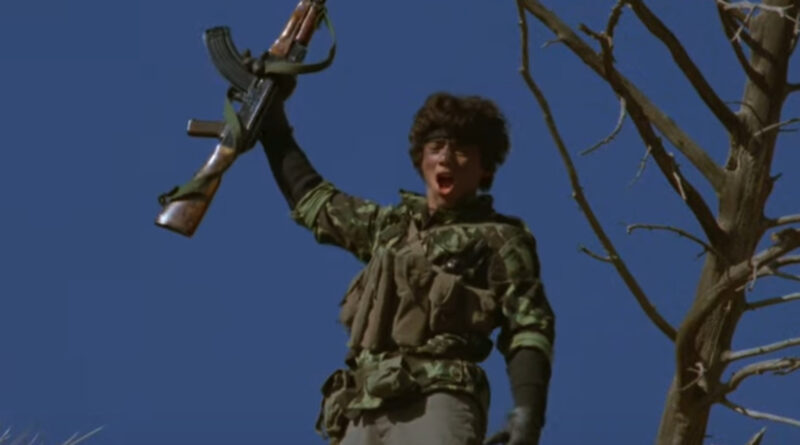The Enduring Truths of Red Dawn: Beyond Caricature and Criticism
Few films elicit as much misunderstanding—and unwarranted disdain—as Red Dawn. Since its 1984 release, detractors have tried to paint it as a Cold War-era relic, steeped in jingoism and thinly veiled propaganda. Yet such criticisms are not just misplaced; they reveal a fundamental misunderstanding of the film’s themes, intentions, and artistry.
To call Red Dawn propaganda is to reduce a deeply human story to a caricature—a caricature critics desperately want it to be, but which it is not. Propaganda is a blunt instrument, unburdened by complexity or nuance. Red Dawn is neither. It is a film about the best and worst of human nature, patriotism as both virtue and vice, and the profound moral and emotional costs of war.
As Aleksandr Solzhenitsyn so eloquently said, “The line separating good and evil passes not through states, nor between classes, nor between political parties either—but right through every human heart.” This is the essence of Red Dawn.
A Movie About People, Not Politics
At its core, Red Dawn is not about politics in a left-right dichotomy. The film’s antagonists are Soviets, but Communism is not discussed, nor is the film’s focus on ideology. Instead, the film centers on people—brothers, neighbors, and countrymen—thrust into extraordinary circumstances.
The story begins in the small town of Calumet, Colorado, where an invasion by Soviet and Cuban forces shatters the fabric of everyday life. The teenagers who flee into the mountains do so not to form a resistance, but simply to escape the chaos and violence overtaking their town. They are not soldiers or ideologues but ordinary young people seeking safety. It is only later, when survival demands action and the gravity of their situation becomes clear, that they transform into the resistance known as “The Wolverines,” confronting extraordinary moral and physical challenges far beyond their years.
Through their journey, Red Dawn explores the duality of patriotism. On one hand, it inspires acts of heroism and selflessness, as the characters fight to protect their home and loved ones. On the other hand, it leads to moral compromises and the loss of innocence. Jed Eckert (Patrick Swayze), the group’s leader, becomes a symbol of this duality. Once just the typical older brother, he is transformed into a hardened guerrilla commander, burdened by the weight of his decisions.
The Humanity of Red Dawn
What makes Red Dawn so powerful is its humanity. The film does not glorify war; it mourns it. The teenage partisans lose friends, family, and their own sense of identity. They face betrayal, despair, and the constant specter of death.
The movie’s emotional resonance is underscored by its refusal to offer easy answers. The characters are neither saints nor villains; they are deeply flawed, deeply human individuals. This is not a story about good versus evil in a geopolitical sense, but about the moral and emotional struggles of people caught in an unforgiving situation.
This complexity sets Red Dawn apart from true propaganda. Propaganda seeks to manipulate, to flatten the world into black-and-white certainties. Red Dawn, by contrast, revels in ambiguity. It acknowledges that war is not just a clash of ideologies but a deeply personal, deeply human experience.
Jed: The Reluctant Leader
Jed Eckert stands at a poignant crossroads between youth and adulthood. At twenty years old, he is old enough to bear the weight of responsibility yet still close enough to his teenage years for the specter of youthful dreams to linger in his eyes. When the invasion strikes, Jed is thrust into a role he never sought—that of leader, protector, and mentor to a group of frightened high-schoolers, many of whom are barely fifteen. His growth is neither triumphant nor celebratory; it is a series of sacrifices, each one chiseling away at his remaining innocence. The burden of leadership leaves little room for grief or hesitation, and Jed’s transformation is heartbreaking in its inevitability. His stoic exterior hides the boy he still is, a boy forced to harden himself to survive.
Robert’s Descent
Robert Morris embodies the film’s most tragic arc of lost innocence. Beginning as a wide-eyed and timid teenager, he is one of the last to accept the harsh realities of war. But once that threshold is crossed, Robert loses himself entirely. When he kills for the first time, the transformation is immediate and irreversible. The guilt, fear, and uncertainty that once defined him are replaced by an unsettling resolve. His descent is not celebrated but mourned by the film, a vivid depiction of how the horrors of war can distort and consume even the gentlest souls. Robert’s journey serves as a warning: war does not just claim lives; it claims identities.
Lost Innocence as a Central Theme
The loss of innocence pervades Red Dawn as both a personal and collective tragedy. From Jed’s forced maturity to Robert’s chilling transformation, each character confronts a world that demands they abandon the moral clarity of their youth. Even the youngest among them are asked to make decisions far beyond their years, decisions that weigh heavily on their souls. The Wolverines’ camaraderie, once rooted in shared childhoods, becomes a grim bond forged in survival. Red Dawn never shies away from showing the cost of this transformation. It paints war not as a grand adventure but as a thief, stealing innocence and replacing it with scars that never truly heal. The film’s enduring power lies in its ability to make this loss feel personal, a universal reckoning with the fragility of the human spirit.
The Critics’ Misstep
Those who dismiss Red Dawn as propaganda or jingoism often reveal more about their own biases than about the film itself. They see the presence of patriotism and assume the film must be a simplistic flag-waving exercise. But patriotism in Red Dawn is not celebrated uncritically. The film recognizes its power to inspire both nobility and cruelty.
One of the most misunderstood moments in the film is the image of a dead citizen with a bumper sticker that reads, “You can have my gun when you pry it from my cold dead hands.” Critics often interpret this as a rallying cry, but it is, in fact, deeply ironic. The man’s gun has been pried from his cold, dead hands—not by an oppressive government, but by an invading soldier. This moment encapsulates the film’s layered treatment of its themes: a bitter acknowledgment of vulnerability, coupled with a recognition of the role that armed citizens might play in resisting tyranny.
Family and the Line Between Good and Evil
The true heart of Red Dawn lies in its exploration of family and community. Jed and Matt Eckert’s bond as brothers is the emotional centerpiece of the film. Their father’s parting words, “Avenge me,” are not a call to blind vengeance but a plea to uphold the values of family and freedom.
Throughout the film, the characters wrestle with the line separating good and evil. They find themselves committing acts they would have once found unthinkable—acts of violence, betrayal, and cruelty—all in the name of survival. In this way, Red Dawn echoes Solzhenitsyn’s insight: the battle between good and evil is not fought between nations but within every human heart.
Why Red Dawn Endures
Red Dawn is not just a film about war; it is a film about people, about the bonds that hold us together and the forces that threaten to tear us apart. It is a deeply American story, not in a jingoistic sense, but in its exploration of the values—freedom, family, and community—that define the American spirit. Far from glorifying war, the film shows its bitter cost through the eyes of young people whose lives are irreparably changed.
Critics often dismiss Red Dawn as a right-wing power fantasy, imagining it as a tale of triumphant teenagers repelling a foreign invasion with swagger and bravado. But the reality is far different: of the nine Wolverines, seven are killed. Their resistance is neither glamorous nor victorious; it is a hard, desperate struggle for survival. While they manage to make a difference, they do so at an almost unbearable cost, dying not as heroes draped in glory but as ordinary young people pushed to extraordinary lengths. The film’s focus is not on conquest but on the sacrifices made in the name of freedom and the moral ambiguity that accompanies such choices.
To dismiss Red Dawn as propaganda is to misunderstand it. It is a heartfelt, deeply human story that transcends politics and ideology. It is about the choices we make when everything we hold dear is at stake. In its raw emotion, its moral complexity, and its unflinching portrayal of the costs of war, Red Dawn remains an enduring masterpiece—one that deserves to be understood, not caricatured.

